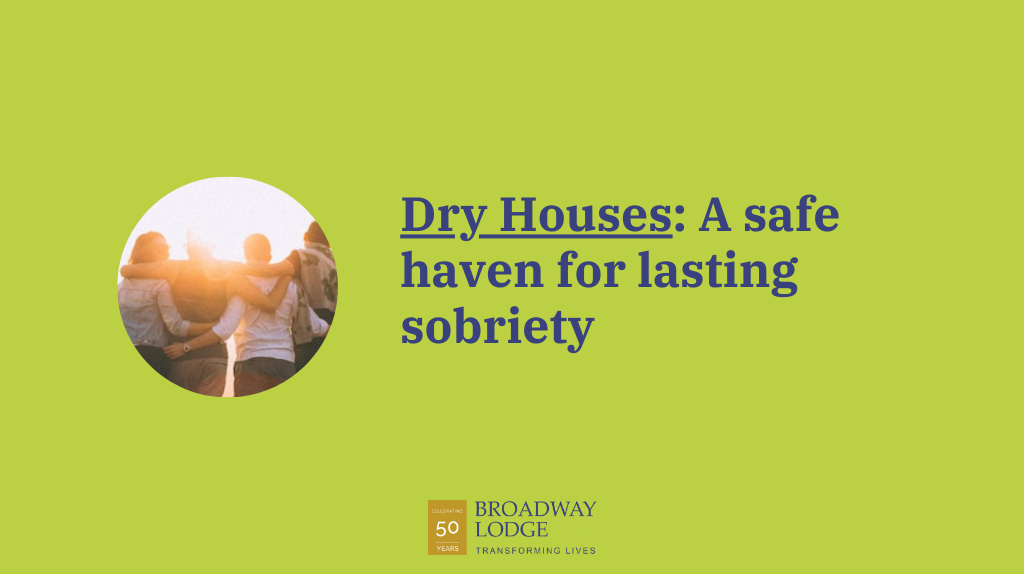Dry houses provide a supportive, structured and substance-free environment for individuals in recovery from addiction.
Key benefits include peer support, life skills development and a focus on maintaining sobriety.
For those struggling with addiction, finding the right support system can be crucial to achieving and maintaining sobriety. One such support option is a dry house, a structured living environment designed to aid individuals on their recovery journeys. In this guide, we’ll explore what a dry house is, how it operates, who it benefits and its effectiveness in supporting long-term recovery.
What is a Dry House?
A dry house, also known as ‘third stage’, a ‘sober living facility’ or ‘sober house’, is a residential setting where individuals in early recovery from substance abuse live together in a supportive, alcohol and drug-free environment.
For those staying here at Broadway Lodge, these houses provide a transitional space for those who have completed detoxification and/or therapeutic treatment but are not yet ready to return to their regular living situation. The primary goal of a dry house is to foster recovery by promoting a substance-free lifestyle and encouraging residents to continue to concentrate on their recovery and to develop healthy habits, coping mechanisms and life skills.
How do Dry Houses work?
Dry houses operate on a set of rules and guidelines that residents must adhere to. These rules are designed to maintain a safe and sober environment and typically include:
- No alcohol or drugs: The most fundamental rule is the prohibition of alcohol and drug use within the premises.
- Curfews and chores: Residents are often required to adhere to curfews and participate in household chores to promote responsibility and structure.
- Regular meetings: Many dry houses host regular group meetings, therapy sessions, or 12-step programmes to support residents’ recovery journeys.
- Peer support: Living with others who are also committed to sobriety provides a valuable network of peer support, offering encouragement and understanding.
- Progress monitoring: Residents’ progress is regularly monitored, and they may be required to participate in drug testing to ensure compliance.
Who are Dry Houses for?
Dry houses cater to a diverse range of individuals, including:
- Recovering addicts: Those who have completed inpatient rehab or detox programmes and need additional support to transition back into everyday life.
- Individuals committed to sobriety: People who are committed to maintaining sobriety but require a structured environment to do so.
- Family and friends of addicts: Dry houses can also be a point of support for family members and friends seeking to understand addiction and its recovery process better.
How long do you stay in a Dry House for?
The duration of stay in a dry house can vary widely based on individual needs and progress. Some residents may stay for a few weeks, while others may remain for several months or one or two years. The decision is typically made collaboratively between the individual, their support network, and the house provider, taking into account factors such as the individual’s recovery progress, personal goals, and readiness to transition into independent living.
Key benefits of dry houses
- Safe environment: Providing a secure, substance-free space helps residents focus on their recovery without external temptations.
- Structured support: The daily routines, rules, and support systems offered by dry houses help residents establish stability and accountability.
- Community and peer support: Living among peers who share similar goals fosters a sense of camaraderie and mutual encouragement, reducing feelings of isolation.
- Encouragement of life skills: Residents gain valuable life skills and coping strategies that aid their reintegration into society and reduce the risk of relapse.
- Training/studying/work: After time, once ready, residents may wish to enrol in a college course or explore paid or voluntary work. We know many former clients who have gained new qualifications and enrolled in university degree courses during their time living in a dry house.
While dry houses are not a one-size-fits-all solution, many individuals find them to be a crucial step in their recovery journeys. By offering a supportive, structured environment, dry houses can play a pivotal role in helping individuals achieve lasting sobriety. Dry house accommodation is often covered by housing benefit and some providers ask for a weekly top-up fee.
Moving into dry house accommodation following treatment at Broadway Lodge is an option to consider if you are looking at starting your recovery journey with us. We have two of our own third stage houses in Bristol and links with many other providers nationwide. If a client decides they would like to explore moving into a dry house, we can help arrange this before they leave Broadway Lodge to ensure a smooth transition into their new home.
If you or someone you know is considering beginning their recovery journey from addiction, contact us to find out about treatment at Broadway Lodge, call our admissions department on 01934 815515 (9am-5pm Monday to Friday) or email hello@broadwaylodge.og.uk.












